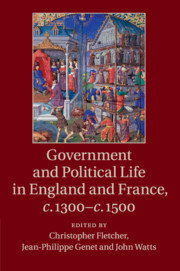Description
Government and Political Life in England and France, c.1300–c.1500
Coordinators: Fletcher Christopher, Genet Jean-Philippe, Watts John
A detailed comparative study of how kings governed late-medieval France and England, analysing the multiple mechanisms of royal power.
Language: English
Government and Political Life in England and France, c.1300-c.1500
Publication date: 04-2020
Support: Print on demand
Publication date: 04-2020
Support: Print on demand
Government and Political Life in England and France, c.1300-c.1500
Publication date: 04-2015
Support: Print on demand
Publication date: 04-2015
Support: Print on demand
Description
/li>Contents
/li>Biography
/li>
How did the kings of England and France govern their kingdoms? This volume, the product of a ten-year international project, brings together specialists in late medieval England and France to explore the multiple mechanisms by which monarchs exercised their power in the final centuries of the Middle Ages. Collaborative chapters, mostly co-written by experts on each kingdom, cover topics ranging from courts, military networks and public finance; office, justice and the men of the church; to political representation, petitioning, cultural conceptions of political society; and the role of those excluded from formal involvement in politics. The result is a richly detailed and innovative comparison of the nature of government and political life, seen from the point of view of how the king ruled his kingdom, but bringing to bear the methods of social, cultural and economic history to understand the underlying armature of royal power.
1. The government of later medieval France and England: a plea for comparative history Jean-Philippe Genet; 2. Courts Malcolm Vale; 3. Kings, nobles and military networks Steven Gunn and Armand Jamme; 4. Offices and officers Christine Carpenter and Olivier Mattéoni; 5. Royal public finance (c.1290–1523) David Grummitt and Jean-François Lassalmonie; 6. Justice, law and lawyers Michelle Bubenicek and Richard Partington; 7. Church and state, clerks and graduates Benjamin Thompson and Jacques Verger; 8. Political representation Christopher Fletcher; 9. Grace and favour: the petition and its mechanisms Gwilym Dodd and Sophie Petit-Renaud; 10. The masses Vincent Challet and Ian Forrest; 11. In the mirror of mutual representation: political society as seen by its members Franck Collard and Aude Mairey; 12. Conclusion John Watts.
Christopher Fletcher is a senior researcher (chargé de recherche) in CNRS (National Centre for Scientific Research) at the University of Paris I (Panthéon-Sorbonne), specialising in the history of late medieval political culture. He has taught at many universities in Britain and France, including London, Cambridge, Lille and 'Sciences Po' (Paris). His publications, in English and French, include Richard II: Manhood, Youth and Politics, 1377–99 (2008).
Jean-Philippe Genet has been professor at the University of Paris I (Panthéon-Sorbonne) for many years, specialising in European cultural and political history. He coordinated the CNRS 'Genèse de l'État moderne' and the ESF 'Origins of the Modern State' programs and more recently the ERC 'Signs and States' project. His publications include La Genèse de l'État moderne: Culture et société politique en Angleterre (2003) and Les îles britanniques des origines à la fin du Moyen Âge (2005).
John Watts is fellow and tutor in History at Corpus Christi College, Oxford. He has written extensively on politics, government and political culture in later medieval Britain and Europe. His main books are Henry VI and the Politics of Kingship (Cambridge, 1996), The Making of Polities: Europe, 1300–1500 (Cambridge, 2009), and an edited collection, The End of the Middle Ages? (1998). He is currently writing a volume in the New Oxford History of England series, entitled Renaissance England, 1461–1547.
Jean-Philippe Genet has been professor at the University of Paris I (Panthéon-Sorbonne) for many years, specialising in European cultural and political history. He coordinated the CNRS 'Genèse de l'État moderne' and the ESF 'Origins of the Modern State' programs and more recently the ERC 'Signs and States' project. His publications include La Genèse de l'État moderne: Culture et société politique en Angleterre (2003) and Les îles britanniques des origines à la fin du Moyen Âge (2005).
John Watts is fellow and tutor in History at Corpus Christi College, Oxford. He has written extensively on politics, government and political culture in later medieval Britain and Europe. His main books are Henry VI and the Politics of Kingship (Cambridge, 1996), The Making of Polities: Europe, 1300–1500 (Cambridge, 2009), and an edited collection, The End of the Middle Ages? (1998). He is currently writing a volume in the New Oxford History of England series, entitled Renaissance England, 1461–1547.
© 2024 LAVOISIER S.A.S.




